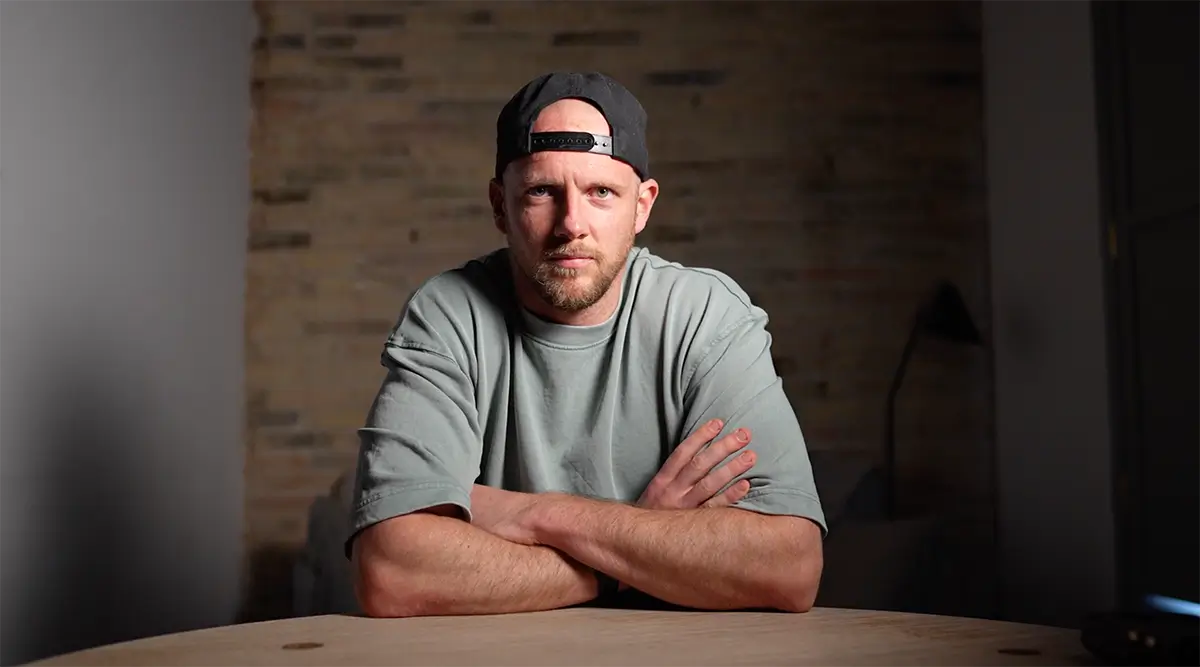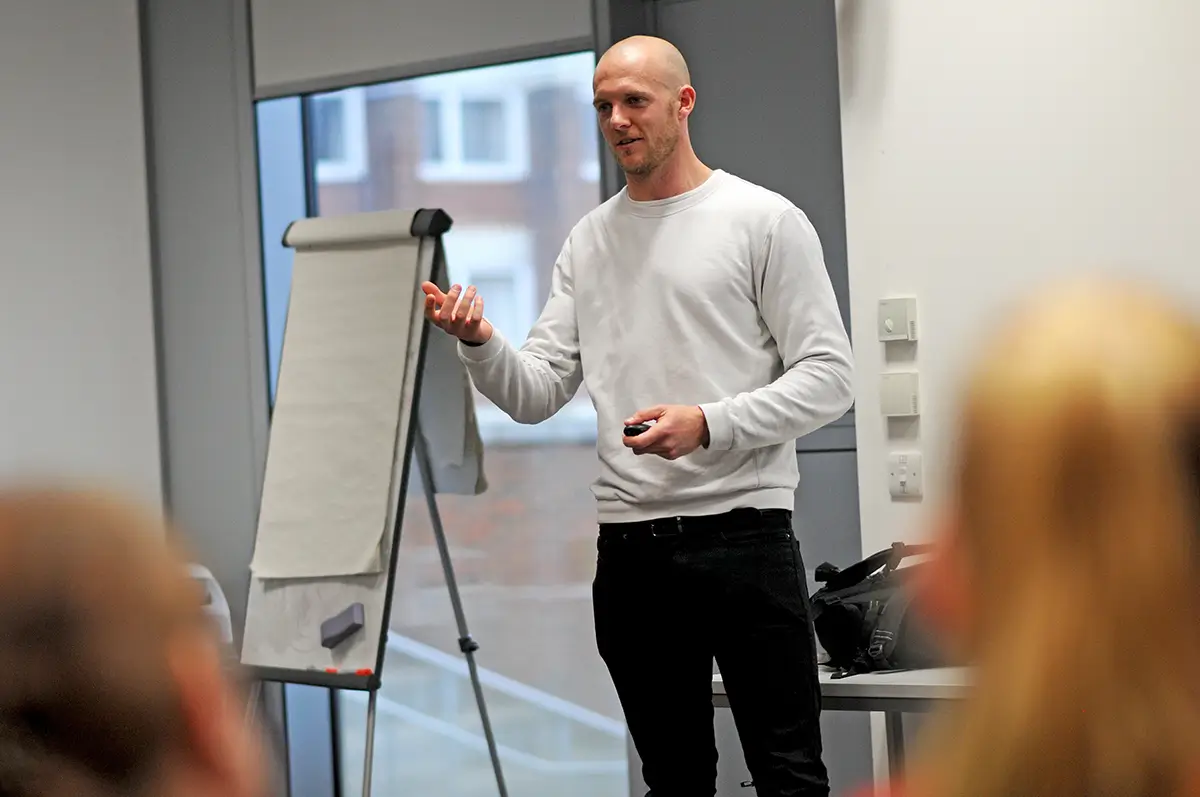Mental Strength Coach: How Lewis Hatchett Became the Speaker Elite Athletes Listen To
Lewis Hatchett speaker profile: ex-pro cricketer turned mindset coach on resilience, pressure, and what sport taught him about peak performance.
Lewis Hatchett speaker profile: ex-pro cricketer turned mindset coach on resilience, pressure, and what sport taught him about peak performance.
Lewis Hatchett has built a career out of rewriting the rulebook. Born with a rare condition that made playing sport unlikely — let alone excelling at it — he defied the odds to become a professional cricketer. Today, he coaches elite athletes and global teams on how to build the mental resilience, emotional intelligence, and self-belief it takes to perform under pressure. His podcast, MindStrong, is known for its honest, no-fluff conversations about mindset, performance, and the real work behind success. We caught up with Lewis to dig deeper.
⮕ Explore Lewis' PepTalk Profile

PepTalk
Hi Lewis! What’s the biggest difference between how you prepare before speaking on stage, versus how you would mentally prepare for a game of cricket? Or is it the same?
Lewis Hatchett
No, they’re definitely not the same. The big difference is that cricket, like any sport, has a physical element. You have to be physically prepared — no amount of mental preparation can make up for that. You can visualise all you like, but if you show up without doing your warm-ups or drills, you’re not going to perform well. Physical preparation also builds confidence and reinforces mental rehearsal.
You can visualise all you like, but if you show up without doing your warm-ups or drills, you’re not going to perform well. Physical preparation also builds confidence and reinforces mental rehearsal.
Once you get past that physical aspect, though, the mental preparation for sport and speaking becomes more similar. I use a three-step process before I go on stage. First, I get calm using a breathing exercise. If I’m not calm, I won’t be any use to the audience.
Second, I remind myself why I’m there. I used to tell myself how lucky the audience was to hear me, but now I shift the focus — I say, “It’s about them, not me.” It takes the ego out of the experience.
Lastly, right before I step on stage, I say to myself, “Watch this.” That comes from Alex Honnold, the free solo climber. Before climbing El Capitan without a rope, he turned to the crowd of about 80,000 people and said, “Watch this.”
For me, it’s a reminder to trust my preparation and go in with confidence. That part is very similar to sport — once the performance starts, it’s all about adapting in the moment.
PepTalk
This reminds me of [social psychologist] Dr. Amy Cuddy’s power poses. Do you think they work?
Lewis Hatchett
In general? Yes, I think there’s something to it. You can’t go up on stage with a rounded posture and expect to come across as confident. In sport, body language makes a big difference. I learned that at the Australian Open. If you can project confidence — even if you don’t feel it — you might gain an edge. You never know if your opponent is about to crack.
You can’t go up on stage with a rounded posture and expect to come across as confident. In sport, body language makes a big difference.
I used to do this in cricket. Even if I got hit for a four or six, I’d keep my posture confident. They might’ve just taken a chance, and if they sense weakness in you, it gives them more momentum.
I actually had Dr Chris Mesagno on the podcast — he’s a leading academic on performing under pressure — and we talked about self-presentation. In high-pressure situations, people often present a version of themselves that doesn’t match how they feel inside. Some act super chilled to hide their nerves, while others become overly tense. Neither approach is ideal. The key is being aware of your internal state while projecting calm and control. That’s where Cuddy’s ideas around posture and presence come into play.
PepTalk
Makes total sense. The All Blacks’ [New Zealand rugby team] haka comes to mind — when people see it for the first time, it’s genuinely intimidating.
Lewis Hatchett
Especially when it’s a team full of six-foot-nine guys. Either way, their haka still has a huge psychological impact.
PepTalk
Absolutely. So moving on, what’s the biggest misconception people have about resilience?
Lewis Hatchett
That you've either got it or you don't. That you can't, you can't develop it if you haven't, if the people who's formed it. I think the more I've delved into, whether it's my own experiences or spoken to world leading academics or just seen in organisations is that a lot of the time it comes down to looking back on your experiences and bringing some form of meaning to them.
Everyone will have somewhere along the timeline, some sort of challenging event. But the narrative and the story that you weave around that event will change how you view yourself coming out of that event. But also know that now, if you go back to those events, even if you have given them some sort of story and meaning, you can change how that looks. The example I give is when I was 16, I broke my back when I was playing cricket. And then I had two years where I didn't play the sport. And I can look back at that and place a story on it.
Though I spent two years out of the sport, that meant everyone else was able to go ahead of me. And I did get opportunities that people didn't have got. And I had to sit with a back brace on and go to hospitals and do rehab and be in the gym and not out there performing and playing.
I can tell myself that story of everything I lost. But then I look back at it and go, in that period of my life, I learned how to be incredibly hardworking, to build structure around a physical routine. I learned to do really uncomfortable things that other athletes weren't willing to do... [Which was] build huge amounts of resilience and characteristics in me that I was able to lean on when I was fit again and forever. And that is through reflection that you can do that. And I think none of that is something you're born with.
It can be trained, it can be taught. It doesn't mean that it's instant. But it just means that if you're willing to put in the work, you can get the result.

PepTalk
What’s one book you recommend over and over again?
Lewis Hatchett
The Chimp Paradox by Professor Steve Peters. It’s simple, practical, and works across sport, business, or life. If someone’s going through a tough time or struggling to understand their emotions, that’s my go-to recommendation. It breaks down complex psychological ideas in a way anyone can grasp. It’s not the only model out there, but it’s a brilliant starting point.
Another one I’d recommend is Open by Andre Agassi. It’s raw and honest — he’s an eight-time Grand Slam champion who hated a lot of what he did. It shows how high performance isn’t always glamorous. It can be painful. It can cost you relationships. But the journey, and what comes after, can be transformative.
It can be ugly, not beautiful. It can have real lows and take time. It can cost you relationships, family, friends, and loved ones, but also this beautiful sort of renaissance that came out of it, of how he completely changed as a person once he was able to go through that.
PepTalk
I’ve been meaning to read that. I heard that he had a very tough relationship with his coach, or was it his dad?
Lewis Hatchett
His dad was his first coach. Then eventually Brad Gilbert came in and changed everything. Later, he worked with Darren Cahill. What’s interesting is that both coaches weren’t all about tennis technique—they focused more on mindset. That’s actually where I’m doing more work now, especially in tennis.
PepTalk
Interesting, from cricket to tennis.
Lewis Hatchett
Yeah, with individual athletes. Most of the time, they don’t need help with forehands or backhands. They just need to feel mentally prepared — like they’re capable. It’s not that different from business, really. You hire someone in your marketing department, you hire someone in your engineering department, your financial department, those people, you hire them because they're probably more than capable of doing the task.
So your job as a leader is to make them really feel like they're a part of something or they can do it or they want to do it. They're motivated to explore, get better at it, whatever it might be. Very rarely are you telling them how to do what to do. They do, because you shouldn't be. If you're doing that, you’ve hired the wrong person.
This interview has been edited for length and clarity.

💡 Ready to strengthen your team’s mindset with Lewis? Email us at lewis.hatchett@getapeptalk.com or send us a message via the chat. You can also call us on +44 20 3835 2929 (UK) or +1 737 888 5112 (US). Remember, it’s always a good time to get a PepTalk!